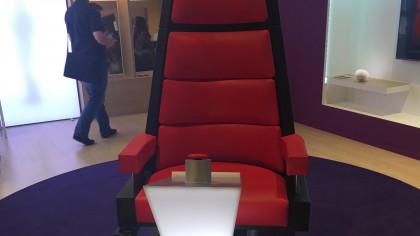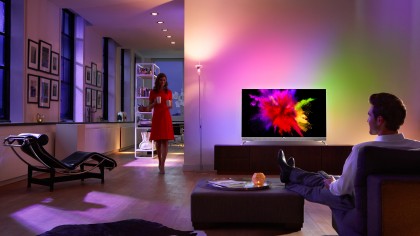A horror film that controls your sound and lighting is scarily close
Philips tie-in with The Voice is the writing on the connected wall

At first it's easy to overlook Philips Hue's tie-up with The Voice – especially if you aren't especially au fait with spinning chairs, Miley Cyrus and CeeLo Green – but when you pause to think a little longer about the concept it's really rather interesting.
To explain, Philips Hue has become the industry giant in controllable lighting – letting you set the colour and brightness of your lights through an app.
The tie-up with US television singing contest The Voice lets the program's app take over your Hue lighting system and decide what effects best complement what you're seeing on the screen. So far, so cheesy.
But let's forget, for the moment, that the tie-in is with The Voice, and pretend it's with a major film studio. And let's expand the concept of entertainment taking over your connected home to beyond the lights.

Now, let's fire up the special app, queue up a 4K Blu-ray of the latest Hollywood Horror and settle back in our Lay-Z-Boy with a bag of popcorn.
Suddenly we have a genuine immersive experience, lights that adapt around the eeriness - plunging you into darkness at critical moments, blaring the lights on.
Without warning, it goes cold as your thermostat cuts the boiler. And that wireless speaker in the room next door is the dull thump of a dead thing banging slowly on the door.
Sign up for breaking news, reviews, opinion, top tech deals, and more.
A smart home being taken over has become a regular trope of sci-fi, but when you use that concept for the power of entertainment it suddenly becomes a potentially brilliant way of making our entertainment even more immersive.

Handing over the control of your house to your television is a pretty alien concept, but it's also utterly within the realm of current technology and clearly something that is beginning to seep into the minds of the producers, directors and technologists.
Many years ago a David Fincher film called 'The Game' starring Michael Douglas released a special Windows program as part of its marketing campaign. You downloaded it, filled in your details and it told you that you were not accepted to play.
And then, without telling you, it would start messing with your stuff - moving folders, deleting desktop shortcuts, changing your desktop background etc. It was mimicking the film itself, which is about a game that challenges your reality and this particular facet was painfully close to having a virus, but, that said, it was conceptually brilliant.
Take that concept into the smart home and you're into a whole new world of thrilling and potentially hugely uncomfortable immersion. Let's just say I've watched enough horror films that I won't be allowing it access to my shower temperature controls…

Patrick Goss is the ex-Editor in Chief of TechRadar. Patrick was a passionate and experienced journalist, and he has been lucky enough to work on some of the finest online properties on the planet, building audiences everywhere and establishing himself at the forefront of digital content. After a long stint as the boss at TechRadar, Patrick has now moved on to a role with Apple, where he is the Managing Editor for the App Store in the UK.